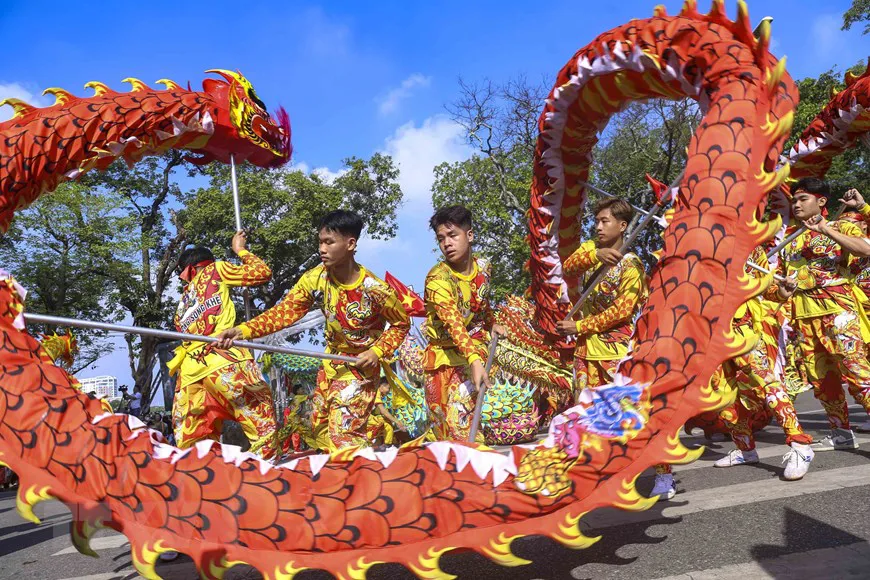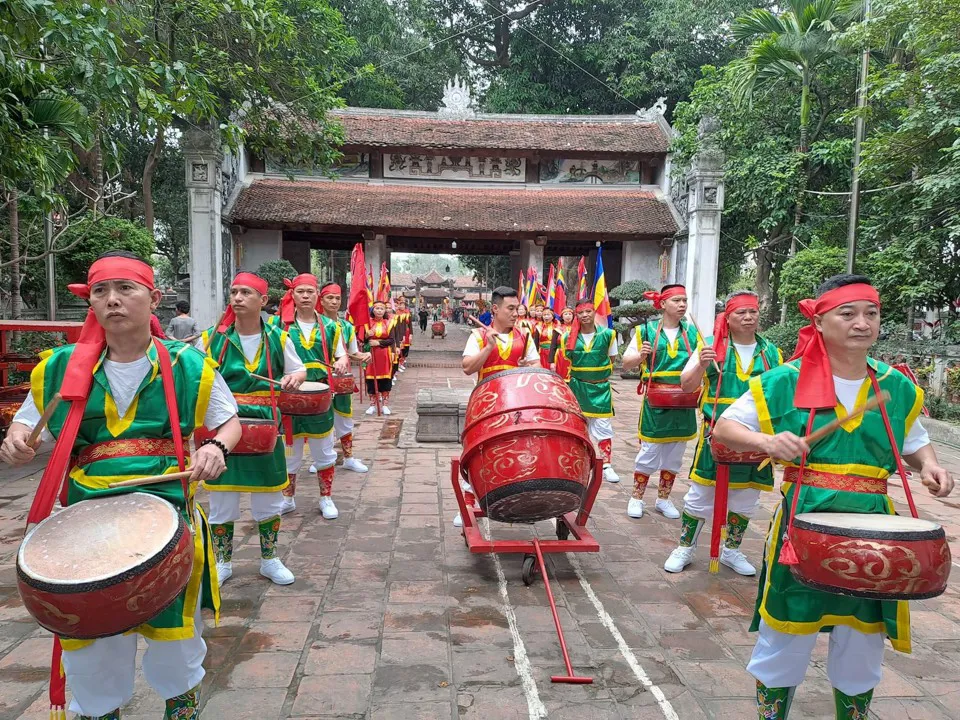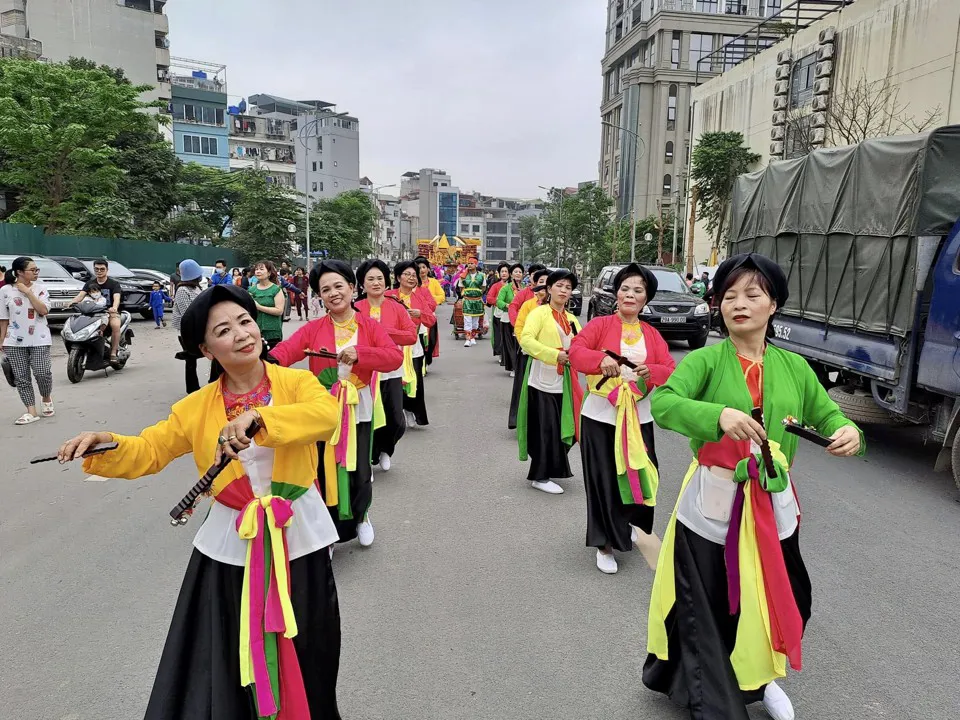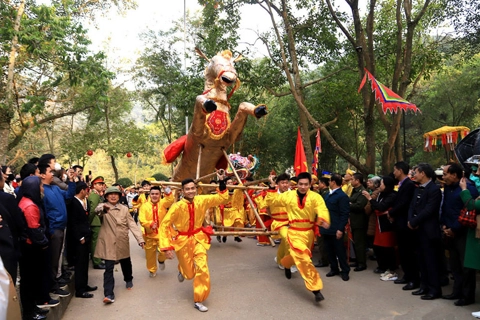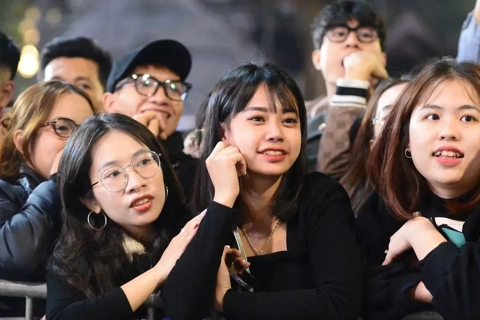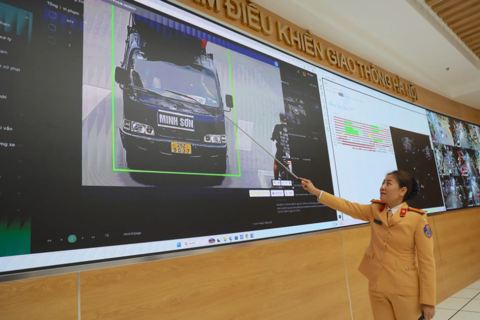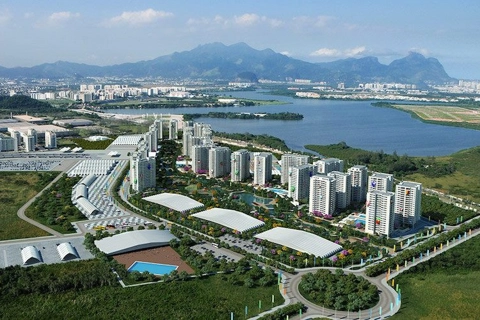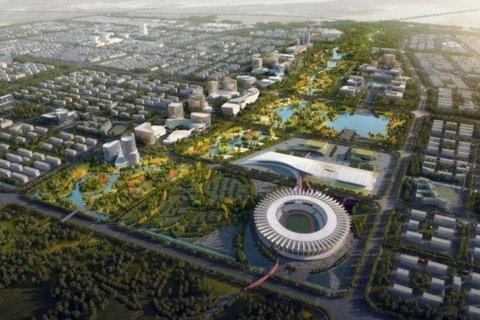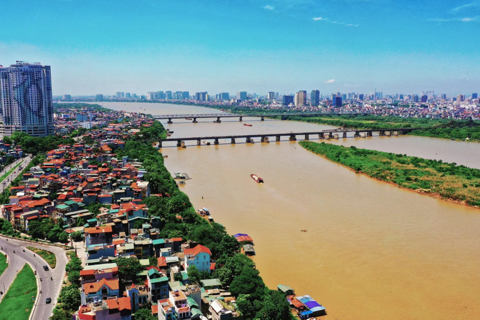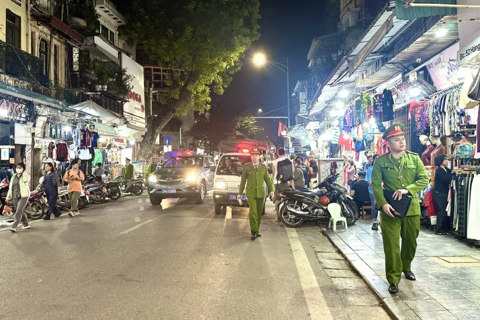Traditional festivals in Hanoi's metropolitan are revived
Many festivals in Hanoi have their own characteristics that must be preserved and restored.
Lang Pagoda Festival, which attracted thousands of people to witness the Battle of the Gods ritual in April this year, is one of the traditional festivals being restored under Hanoi's policy to protect and promote Thang Long cultural values.
The Battle of the Gods ritual, which was reenacted for the first time in 70 years with fireworks, flag dancing and drum performance, is an integral part of the Lang Pagoda Festival. Still, it has fallen into oblivion for many reasons.
Unique features restored
The Hanoi metropolitan area has 12 districts that boast about 221 traditional festivals. Some of them are listed as national intangible cultural heritage, including Le Mat Village Festival (Long Bien District); Loyalty Oath Festival of Dong Co Temple (Tay Ho District); Lang Pagoda Festival (Dong Da District).
| The metropolitan area of Hanoi includes 12 districts with up to 221 traditional festivals. Photo: VNA |
All of them are tradition-laden practices that have an extensive cultural past and are connected to the history of the capital city. There are festivals held jointly by many wards and districts, and those that maintain the traditions of friendship and marriage that have existed for hundreds of years. However, due to the upheavals of time and modern life, many festivals are in danger of ceasing to exist.
According to Dr. Le Thi Minh Ly, Vice President of the Vietnam Cultural Heritage Association, the Hanoi metropolitan area is poor in intangible cultural heritage, including festivals, compared to suburban areas.
"The risk of traditional festivals in the inner city fading into obscurity is heightened by deteriorating community cohesion. Therefore, the protection of traditional festivals in Hanoi's metropolitan area becomes even more imperative to preserve ancient Thang Long cultural values," Ly said.
Faced with the need to protect and promote Thang Long cultural values, the Hanoi Department of Culture and Sports and the authorities of the metropolitan area have been working in recent years to restore the festivals to their original origins.
In 2023, the palanquin procession ceremony and the Battle of the Gods ritual at the Lang Pagoda Festival were restored after 70 years of interruption, with tens of thousands of people attending. People in Dong Da, Thanh Xuan, Cau Giay districts joined hands to contribute to the revival of cultural rituals in the western land of the ancient capital of Thang Long.
The Loyalty Oath Festival at Dong Co Temple (Tay Ho District) and the Five Moc Villages Festival (Thanh Xuan District) were also restored, with all traditional rituals re-enacted, to bring back traditional festivals to the metropolis.
Preserving valuable heritage
It can be seen that festivals in downtown Hanoi have represented unique nuances of traditional rituals and customs of Hanoi people. Protecting and promoting the value of traditional festivals in central Hanoi means preserving and promoting Thang Long cultural values, creating resources for the development of the capital's cultural industry, and contributing to the positioning of Hanoi's culture brand.
| Drum performance at the Lang Pagoda Festival. Photo: The Hanoi Times |
Although the Hanoi Department of Culture and the People's Committee have recently restored many rituals in traditional festivals, there are still many that need to be revived.
But first, as researcher Tran Lam Bien put it, "Many festivals in Hanoi have their own characteristics that must be respected and preserved if you want to restore them. You have to understand them properly, because over time, many customs and rituals in festivals have not been properly understood, leading to improper restoration."
Among the many solutions proposed to protect and promote the value of traditional festivals in the inner city, regulators and scholars all believe that coordination between regulatory agencies and the community is needed to restore rituals and ceremonies.
The government should work with specialized organizations to collect documentation, hold seminars, and prepare dossiers for recognition of national intangible cultural heritage if it is eligible. In addition, the public should be involved in the celebration of festivals.
With a strong background in organizing traditional festivals, Le Xuan Ke, a member of the management committee of Phu My communal house relics, Nam Tu Liem District, said that in addition to strengthening the responsibility of authorities, people need to be made aware of the need to protect and promote the value of intangible cultural heritage. Management agencies must also mobilize investment from many different sources and have policies to preserve traditional practices and pass on heritage.
| It's necessary to get people involved in celebrating traditional festivals. Photo: The Hanoi Times |
According to Do Dinh Hong, Director of Hanoi's Department of Culture and Sports, the city government always encourages and creates conditions for the community to practice and promote the cultural value of traditional festivals.
In addition, the Hanoi Department of Culture and Sports will continue to support the community in researching and restoring traditional ceremonies, rituals and folk games, and in passing on knowledge to the younger generation.
Although there are still many difficulties, but with the high determination of management agencies and communities, traditional festivals in the metropolitan area will gradually revive, contributing to the enrichment of cultural and spiritual life among the people, said Hong.

